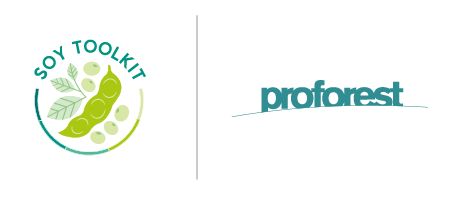Soy Toolkit Podcast with Sarah Rogerson
The Soy Toolkit team spoke to Sarah Rogerson, Researcher on the Supply Chain Programme at Global Canopy’s Forest 500 programme.
Sarah and her team recently released the Forest 500 report, identifying and raking the 500 most influential companies and financial institutions in forest risk supply chains.
What were the latest Forest 500 ranking’s key findings with regards to soy?
We found that commitment and implementation on soy supply chains is still lagging behind other commodities. Companies are far more likely to be setting strong commitments on palm oil, timber and paper than for soy. Besides, only 28% of the companies we reviewed that are involved in supply chains have made commitments to protect forests. This is making it clear that within a company, other commodities are getting more attention.
Another finding was the fact that soy commitments are more likely to be regionally focused. One quarter of the commitments we saw on soy were only applied to some regions. For instance, they are often only applied to the Amazon, rather than the whole, global supply chain.
What are some of the barriers to sourcing responsible soy? How can brands overcome them?
Most of companies’ (manufacturers and retailers) exposure will be through indirect soy – in the animal feed for meat and dairy products, rather than direct ingredients into their products. This makes it more complicated to know how much soy is in their supply chain, as well as to be able to trace the supplies and implement commitments throughout that supply chain.
However, it doesn't mean that it's impossible. Companies should be engaging with their suppliers to understand their supply chains and help them to implement sustainable sourcing practices for animal feed.
2020 sustainability milestones are set to be missed; however much has been accomplished by the retail and food sector to date. To achieve our goal, we must continue to build on this momentum – what needs to be implemented by companies to meet deforestation and conversion free soy commitments?
Many companies had set goals to eliminate deforestation from their supply chains by 2020. Disappointingly, Forest 500 has seen a few companies scaling back their ambition, either by dropping commitments, or removing or delaying their 2020 deadline. Many more will have left existing commitments and may still not be on track to meet them but have not updated them.
Companies should be clearly reporting on their progress, and where they are not able to be met, they should be re-evaluating and updating the deadlines. That is not to say that they should be allowed to be delayed indefinitely, companies must maintain ambition and momentum. But where companies that are making progress and implementing commitments face challenges that delay implementation, they should be transparent about these in their reporting and updating of commitments.
What about financial institutions? How is their role significant in supporting efforts to eliminate deforestation from soy supply chains?
Financial institutions have a unique leverage over companies, to incentivise them to implement more sustainable sourcing and production by setting requirements or favourable rates.
But they're also exposed to risks through the companies that they finance. They need to implement their own sustainable policies to protect themselves. For instance, financing companies with unsustainable practices can expose them to reputational damage, or the companies may be less profitable or unable to pay back loans because of those unsustainable practices.
In our latest assessments of 150 financial institutions that fund the most influential companies in our space commodity supply chains, we found fewer than a quarter had set policies on how soya should be produced or sourced. As with companies, we see financial institutions are less likely to have financing policies for soy than for palm oil or timber.
The Soy Toolkit sheds lights on existing initiatives and resources companies can build on to implement their responsible sourcing policies. We showcase tools like Trase and the online Rural Environment Registry system in Brazil.
How relevant do you think it is for supply chain companies to understand what is out there when they’re implementing their commitments on soy?
Awareness of such tools is a really important first step to help companies to understand, map and drive change in companies’ supply chains.
Many tools already exist and have begun to overcome challenges. Companies should capitalise on this shared knowledge and not start from scratch.
Having all of this in one place in the Soy Toolkit is a great way to help companies identify the tools that are relevant to them and to the stage they are at.
For companies interested in furthering their responsible soy sourcing commitments, we are offering free training from the expert team behind the Soy Toolkit.
Please email us at soytoolkit@proforest.net and we’ll be in touch.

